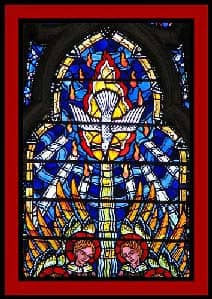Sin, crucifixion, atonement, salvation ... as Christians, these words define who we are, yet often remain mysterious, even intimidating, to us in our everyday lives. Professor of Theology and Ethics Heidi Gehman sheds light on the words central to our faith. This week: PENTECOST.
 Pentecost! The celebration of... what? Flames on heads? Speaking in tongues? The blessing of the Spirit on individuals?
Pentecost! The celebration of... what? Flames on heads? Speaking in tongues? The blessing of the Spirit on individuals?
Although Pentecost was originally a festival celebration of the wheat harvest in ancient Israel, and of the giving of the law which defined Israel as a nation, for Christians it is known as the time when the power of the Holy Spirit came upon the disciples, and is sometimes called the birthday of the church. In that sense, Pentecost, which can also refer to the entire 50 days between the resurrection and the coming of the Spirit, is the celebration of the formation of the church as corporate body. Jesus' promise to send the Holy Spirit to guide his disciples, just before he ascends to heaven, is sealed with the arrival of the Spirit on Pentecost.
The Spirit of God has, of course, been present since the beginning of creation, but the event of Pentecost marks the moment when the Spirit works to mediate the presence of the Risen Christ to the church community. Pentecost, then, is more about the corporate body of the church than about the spiritual presence of God to individual believers. The Spirit is now available to guide the church in its mission to bring the Gospel to the world. The effect on the disciples as they receive the Spirit is interesting in this respect. They begin to speak in languages other than their own, with the crowd who gathers hearing the disciples speak in their own language. This is the reversal of what happened with the curse of Babel, which resulted in confusion and lack of understanding between peoples. Rather, at Pentecost, all are made able to understand the message of the Gospel, and are drawn into the church through the power and understanding given by the Spirit.
What should this mean for us today, as a people of the Spirit? Pentecostalism takes the idea of Pentecost and claims that we can all receive the baptism of the Holy Spirit, and henceforth are called to the "apostolic" ministry as were the first disciples. This ministry, often linked with the charismatic movement, emphasizes the individual blessings of the spirit and the call to evangelize others.
For mainline Protestants, though, with the historic emphasis on the corporate meaning of the blessing of the Spirit, Pentecost is celebrated as the conclusion to the joyous season of Easter. But perhaps we can learn something from the Pentecostals, and bring that joy to bear on how we live in the power of the Spirit, committed to the common life of the church, and its greater role in society. The church, according to the Pentecost tradition, is not a voluntary association, but a summoning by the Spirit to live out a witness to the Gospel message as the body of Christ.
Read other articles from The Word series:
5/14/2010 4:00:00 AM




